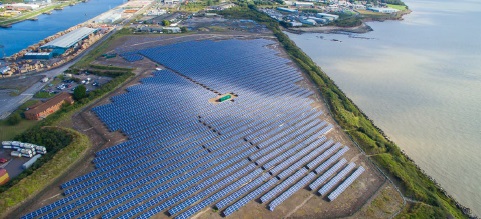In October we saw the launch of the 'Decarbonising Port and Harbours Innovation Network', facilitated by the Knowledge Transfer Network (KTN) as part of Maritime UK Week. The overarching objective of the network is to raise the profile of the critical role ports and harbours need to play in accelerating maritime transport’s transition to net zero by 2050 by giving clear direction for R&D investment.
As Chair of the Innovation Network’s Advisory Group, I hope I can play my part in bringing together industry, solution providers and government departments, in order to collectively agree what our cross-sector priority technological challenges are in meeting net zero objectives, and shaping a forward-looking R&D roadmap and investment plans.
Here at Associated British Ports (ABP), we have made huge strides over the years in decarbonisation. For example we currently have 19MW of solar and wind generating capacity on our sites, which we will increase to 29MW by this time next year, and we have made significant investment in electric and hybrid fleets. The 2050 net zero policy, however, sets a new level of ambition for the UK and the wider sector, which requires a fresh and focused collaborative effort to achieve, as no single player, even one of the larger port players like ABP, can achieve this alone.
Specifically, we need to bring new focus to how we avoid stranded assets as we move away from diesel. Whilst there are emerging hybrid and alternative powered options, as of today diesel driven equipment remains in many instances the only viable option for heavy industrial applications. Significant investment has and is being made in diesel powered port plant and equipment to keep trade flowing, and we need to generate confidence this will not be wasted investment over the 10, 20 or 30 year lifetime of those assets by working out how we move away from diesel or use less diesel for otherwise fit-for-purpose equipment.
This is a challenge not unique to port operators alone, with rail freight, road haulage and many other players in freight movement experiencing the same challenges. The transition to lower and zero emission fuels will also bring with it a more complicated supply and distribution picture with no single fuel of the future, but many, which will be complex. Additionally, the greater demand for renewable generation and electrification will see the increased need for energy storage and removal of grid constraints.
ABP is keen to be part of the solution to help its customers grow whilst reducing emissions. I very much hope that resolving these sector-wide challenges will be accelerated by working together across industry, including understanding the interfaces with the wider transport network such as road, rail and water-borne freight. Ports are and will continue to be a key link between these modes of freight transport, and therefore we are uniquely positioned to help facilitate and drive forward wider transport decarbonisation.
I’m looking forward to helping the Innovation Network realise this potential. If you too wish to get involved, there are various ways you can. The Innovation Network’s work over the next 18-month period will be completed via a series of working groups on Air Quality, Fuel Sources, Benefits, Regulatory and Policy, where we very much need people with expertise in these areas to contribute. The outputs of these working groups will also be shaped during a series of workshops, where we also need expert input.
Alongside the working groups and workshops, we will be utilising the KTN’s Innovation Exchange (see www.ktninnovationexchange.co.uk) on a rolling basis to better understand the range of innovative solutions available or being worked on to address specific technical challenges, starting with avoiding stranded diesel assets in Q4 2020.
We hope to hear from as many innovators as we can through that process. All the knowledge, intelligence and expertise gathered through these work streams, will then be pulled together to develop our roadmap and investment plan for achieving decarbonisation in ports and harbours.
More information, including details on how to get involved can be found at: www.ktn-uk.org/infrastructure/decarbonising-ports-harbours


